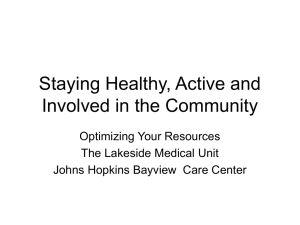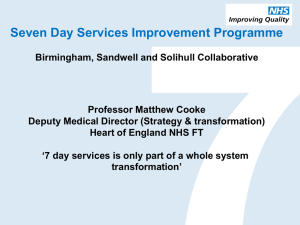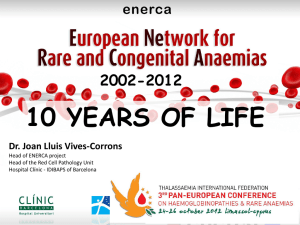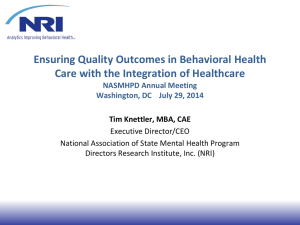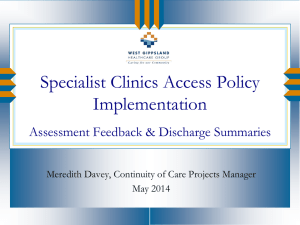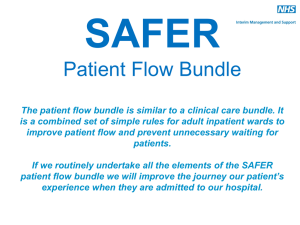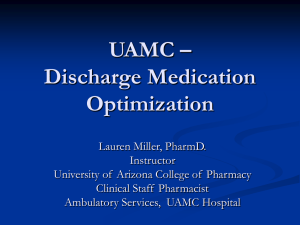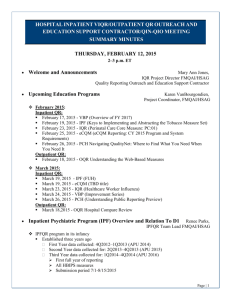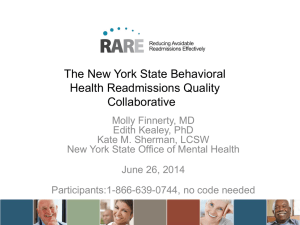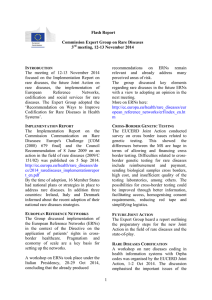Comprehensive Transition Planning
advertisement
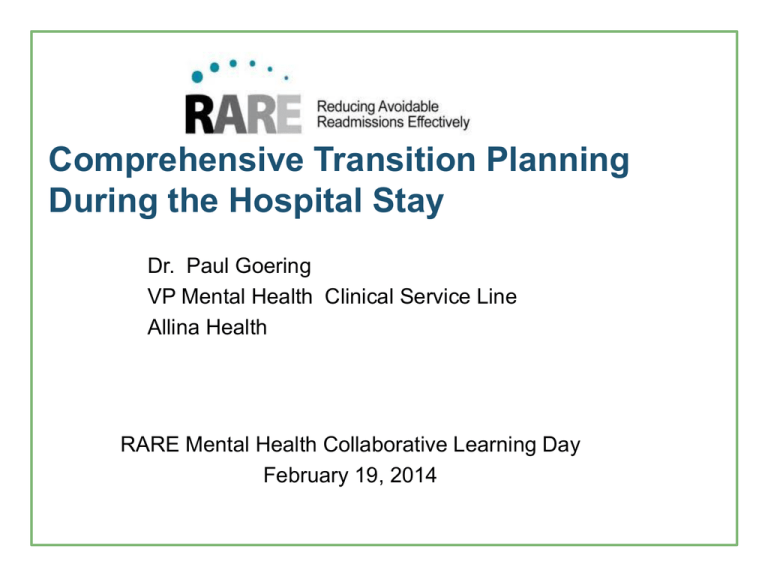
Comprehensive Transition Planning During the Hospital Stay Dr. Paul Goering VP Mental Health Clinical Service Line Allina Health RARE Mental Health Collaborative Learning Day February 19, 2014 What is Comprehensive Transition Planning? Collaboration between patient, their family, and mental health providers to: • Ensure patient’s needs are considered • Information is useful to patients and their subsequent providers • Did we provide what is needed for success? Different from discharge summary • Patient focus • Includes patient-specific recommendations * From Recommended Actions for Improved Care Transitions Mental Illnesses and/or Substance Use Disorders ( RARE Campaign) Comprehensive Transition Planning Key Recommendations for All Patients Reason for Hospitalization and Transition Plan Patient/Family Focused Communicated at an appropriate level of health literacy Medication management Comprehensive Medication Reconciliation process Dose, times, how to take, what to avoid Where to obtain refills, Indication for medication This has been a technical challenge! * From Recommended Actions for Improved Care Transitions Mental Illnesses and/or Substance Use Disorders ( RARE Campaign) Key Recommendations for All Patients (Continued ) Self Care - Nutrition Exercise Crisis Management Plan Coordination and follow-up appointments - Engage patient to identify and arrange appointments early during patient’s hospital stay - Coordinate visit with patient and their caregivers at home to insure appointment can be kept Transition plan written for patient Written at patient’s level of health literacy * From Recommended Actions for Improved Care Transitions Mental Illnesses and/or Substance Use Disorders ( RARE Campaign) Comprehensive Transition Planning Specifically for Patients with Mental Health Problems • • • • Coping Skills Nutrition/Exercise, diet Recovery goals and plan If acute of chronic medical condition with new depression or anxiety diagnosis, then schedule a mental health follow-up visit • If there are physical health considerations and patient does not have a primary care providers, then engage patient and help arrange a follow-up visits 5 Are we providing what patients need for success? Collaboration and Recommendations for Next Provider 6 Comprehensive Transition Planning: Collaborating with the Next Provider • Barriers that may limit patients’ options post-hospital mental health care - Limited access to specialty providers - Geographic - Payment & insurance Comprehensive Transition Planning: Collaborating with the Next Provider • Anticipating patients discharge needs - Engage patient choice early - Multidisciplinary Transition Conference to communicate among patient and Care Team - Communicate the Plan and Recommendations immediately after discharge - Timely follow-up appointments for priority needs Strategies that Improve Patient and Next Provider Transition Planning • Establish best practice and garner leadership support • Changing the culture - Collaborate as team - Look beyond the current inpatient stay - Use patient survey results • Performance Improvement Process - Establish measurable goals - Standardize Discharge Plan and Recommendations - Provide feedback on success Strategies that Improve Patient and Next Provider Transition Planning • Leverage Electronic Health Care Records where available (EHR) • Allina uses Excellian (EPIC) - Pilot for standardize discharge summary for Mental Health inpatients and recommendations to next provider - Automatic reminders and prompts for HBIPS - Automatic Routing to Next provider - Creates an After Visit Summary for the patient These RARE Complement HBIPS* Quality Improvement Measures *Hospital-Based Inpatient Psychiatric Services HBIPS-6: Post Discharge Continuing Care Plan Created HBIPS-7: Post Discharge Continuing Care Plan Transmitted to Next Level of Care Provider Upon Discharge Rare Initiatives dovetail with HBIPS National Quality Improvement Measures Sponsors for HBIPS measures include: • Centers for Medicaid and Medicare (CMS) • The Joint Commission (TJC), • National Association of Psychiatric Health Systems (NAPHS), • National Association of State Mental Health Program Directors (NASMHPD) • National Research Institute, Inc. (NRI) Rare HBIPS 7 HBIPS 6 Hosp. Reason HBIPS Hospital Based Inpatient Psychiatric Services Cross walk Hosp. Reason DC Self Care meds activities Crisis Coordinate Easy to Management F/up Visits understand Plan Plan (AVS)** X Primary dx DC meds X Care Plan (ROP*) X Care Plan transmitted X * Recommendations for next Outpatient Provider (Excellian) X ** AVS After Visit Summary for patients (Excellian) Why is transition planning important? • Without it – we fail to provide best services to our patients • Seen by the public and value-based purchasers • Consistent with healthcare system mission to improve care quality after hospitalization • On going educational, leadership and performance improvement needed to support Transition Planning on inpatient units
